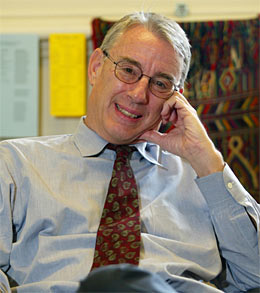UC Berkeley Press Release
Professor emeritus Peter Lyman dies at age 66
BERKELEY – Peter Lyman, a professor emeritus at the University of California, Berkeley's School of Information and a former university librarian whose legacy includes research on online information, ethnographic analyses of online social relationships and communities, and helping to bring university libraries into the digital era, died Monday (July 2) at his Berkeley home. He was 66 and had battled brain cancer.
 Peter Lyman (School of Information photo) |
One of Lyman's most widely cited works is "How Much Information?" a 2004 study with School of Information colleague Hal Varian that tracked the staggering amount of information produced digitally in a year.
In 2005, Lyman became the director of the Digital Youth Project, a three-year collaborative investigation founded by the John D. and Catherine T. MacArthur Foundation of how kids use digital media in their everyday lives - at home and in libraries, after-school programs and public places. The goal of the project is to enhance the learning experiences of youth, and to help families and schools use digital media for education.
Colleagues said that Lyman was responsible for influential work in information science as well as a cadre of devoted graduate students in the field.
"Peter was extraordinarily dedicated to his students, his teaching, and his research," said Lyman's friend and colleague Nancy Van House, a professor at the information school. "He was a joy to work with, always interested in new ideas and new people. My best-ever teaching experience was team-teaching a required graduate course with him: I learned a lot, the students learned a lot, and we all laughed a lot, too."
"What I remember most is how much (our talks) always energized and motivated me to continue trying to change the world," said Danah Boyd, a doctoral student at the School of Information who was Lyman's mentee and friend.
Lyman published extensively on technology transfer and institutional change, exploring the effects of information technologies on the forms and content of publishing, libraries and research. He was one of the country's first scholars to work with computer companies and others to design information technology appropriate for research and teaching. His 2004 analysis of metaphors such as "virtual community," "information highway" and "digital library" expressed concern that they can be stretched so far as to inhibit thinking about real problems.
Lyman was born in San Francisco in 1940. He earned a B.A. in philosophy from Stanford University in 1962, his M.A. in political science from UC Berkeley in 1963, and his Ph.D. in political science from Stanford in 1972.
He was one of the founders of James Madison College, a residential college at Michigan State University with a public policy focus and was a faculty member there from 1967 to 1987. He also was a visiting professor at Stanford and UC Santa Cruz.
In 1987 Lyman moved to the University of Southern California (USC), where he founded the Center for Scholarly Technology and served as its executive director. He also was associate dean for library technology at that university before becoming USC's university librarian in 1991. At USC, he helped envision and oversee the creation of a new, technologically advanced undergraduate library.
He returned to UC Berkeley in 1994 to serve as the campus's seventh university librarian until 1998. He also joined the School of Information Management & Systems (now the School of Information) as a professor in 1994. Lyman recollected in an interview after coming back to the campus where he earned a master's degree that during his graduate student days, he would visit UC Berkeley's main library "to ask for the most esoteric material I could think of, and they would come up with it."
Lyman was associate dean of the information school for several years and "managed that sometimes difficult job with grace and good nature," said Varian.
"Despite being famously modest and unassuming, Peter was a natural leader," said Mizuko "Mimi" Ito, a USC research scientist who worked with Lyman on the Digital Youth Project.
"It was clear that he felt that scholarly work was done in the service of improving the world and the lives of others," Ito said. "In our work together, he always insisted on looking at questions that were meaningful and significant in the real world, to start with the phenomenon and the stories people told about their lives."
Lyman became an emeritus professor in 2006. He served on the editorial boards of the numerous academic journals relating to information technology and society as well as on the board of directors of Sage Publications, the Council on Library and Information Resources, the Art History Information Project at the Getty Trust, and the Internet Archive.
Lyman was passionately interested in and knew a great deal about Asian -- especially Tibetan and Chinese -- art and textiles. Matteo Bittanti, a post-doctoral researcher at UC Berkeley's School of Information, recalled this week in an online post that Lyman loved Caravaggio, gelato and good company. "He fought infinite battles against bureaucratic abominations," he wrote about Lyman, his former supervisor. "He was always calm and serene, yet strong and determined. Above all, he was a great human being."
Lyman is survived by his wife, Barrie Thorne, a UC Berkeley professor of gender and women's studies, and sociology; son, Andrew Thorne-Lyman of Rome, Italy; daughter, Abigail Thorne-Lyman of Berkeley; twin grandsons just seven weeks old; and a sister, Cynthia Lyman of Kent, Wash.
The School of Information is planning a campus memorial service for early in the fall semester. Contributions to the newly established Peter Lyman Graduate Fellowship in New Media can be made to the UC Berkeley Foundation for the Peter Lyman Graduate Fellowship, at the UC Berkeley Center for New Media, 390 Wurster Hall #1066, UC Berkeley, Berkeley, CA, 94720.

